Elementary
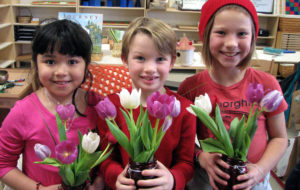 In the Elementary program at Mountainside, students from 6 to 12 years old continue their journey from the Primary classroom, learning and developing academic, personal, and social skills that they will use throughout their lives. In addition to developing their minds, the students learn to work with others, collaborate to find solutions, and work within their classroom community to establish an environment that is respectful and peaceful for all its members.
In the Elementary program at Mountainside, students from 6 to 12 years old continue their journey from the Primary classroom, learning and developing academic, personal, and social skills that they will use throughout their lives. In addition to developing their minds, the students learn to work with others, collaborate to find solutions, and work within their classroom community to establish an environment that is respectful and peaceful for all its members.
At Mountainside Montessori, Elementary students are also a part of a unique vision that includes a connection to the land, from time spent free to explore and play outdoors, to helping the Adolescents with care of animals and sustainable farming.
The Montessori curriculum is designed so that each child is allowed to progress at a rate that encourages mastery of a subject, while allowing further exploration of a child’s special interests. It is a fully inclusive program, allowing students of many different abilities, ages, and interests to come together in their learning. Students take responsibility for their learning by scheduling their activities, attending lessons, collaborating on larger projects, and maintaining a close relationship with the guide, or teacher, who motivates, inspires, and helps direct learning. The flexibility in a school day allows the students to learn to manage their time and to pursue interests in greater depth.
THE ELEMENTARY PROGRAM FOCUSES ON THE FOLLOWING AREAS:
Math
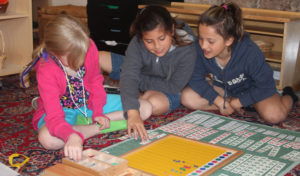 Mountainside teaches math in an authentic Montessori fashion. This means that math is not considered an independent and theoretical discipline, but an aspect of culture. The Story of Numerals recounts the origins of counting, measuring, and numeric symbols. Classroom materials are three-dimensional and manipulative, helping children discover arithmetic, geometric, and algebraic correlations – and forming meaningful images of abstract concepts. The necessary repetition of exercises for mastery comes through working on core skills in a variety of ways.
Mountainside teaches math in an authentic Montessori fashion. This means that math is not considered an independent and theoretical discipline, but an aspect of culture. The Story of Numerals recounts the origins of counting, measuring, and numeric symbols. Classroom materials are three-dimensional and manipulative, helping children discover arithmetic, geometric, and algebraic correlations – and forming meaningful images of abstract concepts. The necessary repetition of exercises for mastery comes through working on core skills in a variety of ways.
Starting with mathematical symbols and nomenclature, and including addition, subtraction, multiplication and division, students learn arithmetic. Students gain an understanding of numeration, the decimal number system, negative numbers, fractions, and percentages.
Algebra, which is generalized arithmetic applied to unknown quantities, comes next. Students study the properties of math, non-decimal base numbers, powers of numbers, operations with exponents, square and cube roots, and powers of ten, including word problems. The Upper Elementary curriculum also includes studies with graphs, probability and statistics, algebraic expressions and equations, ratio, and rate and proportion.
Geometry studies begin with the history of Euclid and Pythagoras. Students study nomenclature and symbols, lines, polygons, circles, and measurement. The Guide leads the child to improve the reasoning process and understand relationships, so they can begin to calculate area, volume, and more.
Science
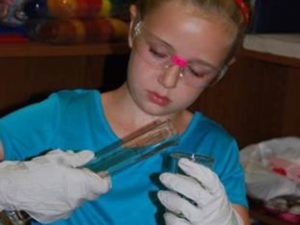 Science in the Montessori environment is based on introducing children to broad and advanced topics during their early years, thus planting the seeds for a lifetime of discovery. At the same time, the Montessori materials and lessons are meant to encourage a sense of wonder at the grandeur of the universe, the simple beauty of the physical laws, the miracle of life, and the interconnected nature of all living things.
Science in the Montessori environment is based on introducing children to broad and advanced topics during their early years, thus planting the seeds for a lifetime of discovery. At the same time, the Montessori materials and lessons are meant to encourage a sense of wonder at the grandeur of the universe, the simple beauty of the physical laws, the miracle of life, and the interconnected nature of all living things.
Topics of Science study at Mountainside range from how the world began to basic principles of astronomy, botany, chemistry, geology, meteorology, physics, and zoology. More advanced study includes the scientific method, the periodic table of elements, photosynthesis, mechanics, and electricity. Exploration of these concepts is then reinforced by the use of experiments and Montessori impressionistic charts and timelines. This is the beginning of the development of scientific thought. Our students’ questions become their hypotheses and through the power of observation, they come to their own conclusions about the laws of the universe. Students are introduced to many ideas and topics in science over the course of their six years in the Elementary classroom.
Language
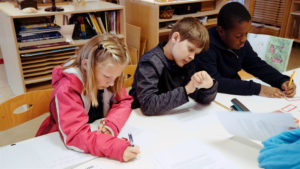 Writing with clarity and reading with fluency are important goals of the language curriculum. In reading, students continue to work on decoding and fluency, semantics and syntax, vocabulary, literature and genres, and research skills. Writing focuses on composing words, the writing process, the mechanics of handwriting and keyboarding, conventions and punctuation, spelling, and organizing ideas. Grammar topics include parts of speech, sentence analysis, and advanced verb study.
Writing with clarity and reading with fluency are important goals of the language curriculum. In reading, students continue to work on decoding and fluency, semantics and syntax, vocabulary, literature and genres, and research skills. Writing focuses on composing words, the writing process, the mechanics of handwriting and keyboarding, conventions and punctuation, spelling, and organizing ideas. Grammar topics include parts of speech, sentence analysis, and advanced verb study.
Geography, History & Social Studies
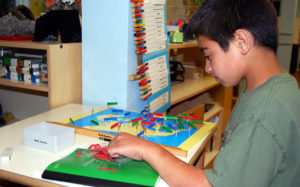 Students continue to study geography in more detail from the geography maps presented in the Primary environment. The structure of the Earth, physical geography, political geography, and mapping are included in Mountainside’s Elementary curriculum. The history and social studies curriculum strives to introduce ideas that students can really ponder. The origin of the universe, the formation of Earth, the fundamental needs of human beings, the history of writing, the measurement of time, early and modern humans, ancient civilizations, and American history are all introduced and studied.
Students continue to study geography in more detail from the geography maps presented in the Primary environment. The structure of the Earth, physical geography, political geography, and mapping are included in Mountainside’s Elementary curriculum. The history and social studies curriculum strives to introduce ideas that students can really ponder. The origin of the universe, the formation of Earth, the fundamental needs of human beings, the history of writing, the measurement of time, early and modern humans, ancient civilizations, and American history are all introduced and studied.
Spanish
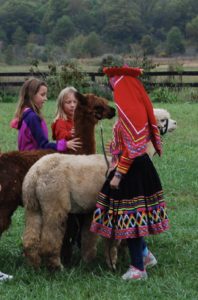 Upper Elementary and Third Year students have 80 minutes of Spanish instruction each week, while First and Second Year students have 40 minutes. The students explore the Spanish language through topics that are familiar to them, for example, greetings, expressions of courtesy, simple dialogues, playful rhymes and songs. The Spanish program is enriched with age-appropriate audio/video materials and literature activities. Students also learn about many cultural aspects of the Spanish-speaking world.
Upper Elementary and Third Year students have 80 minutes of Spanish instruction each week, while First and Second Year students have 40 minutes. The students explore the Spanish language through topics that are familiar to them, for example, greetings, expressions of courtesy, simple dialogues, playful rhymes and songs. The Spanish program is enriched with age-appropriate audio/video materials and literature activities. Students also learn about many cultural aspects of the Spanish-speaking world.
Practical Life
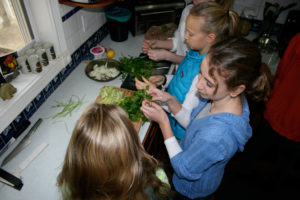 Elementary students engage in building practical skills such as cooking, gardening, composting, managing their materials and time, making presentations, and organizing activities. Each student is accountable for completing class work in the time allotted and confers with teachers weekly to chart progress. As children move forward, they are given increasing responsibility in planning and executing their weekly tasks. In Upper Elementary, students’ practical life lessons include technology, learning and practicing online research, and keyboarding.
Elementary students engage in building practical skills such as cooking, gardening, composting, managing their materials and time, making presentations, and organizing activities. Each student is accountable for completing class work in the time allotted and confers with teachers weekly to chart progress. As children move forward, they are given increasing responsibility in planning and executing their weekly tasks. In Upper Elementary, students’ practical life lessons include technology, learning and practicing online research, and keyboarding.
Grace & Courtesy
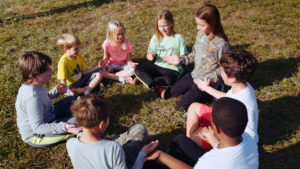 The Elementary child has a strong need to apply the rules of social justice in his/her community. Grace and Courtesy tenets provide the tools that the child needs to navigate the interactions that follow. The peaceful resolution of conflicts is an important goal in the Mountainside Elementary classroom. The older the students become, the better they are able to resolve disputes on their own. Teachers and our older students are available to facilitate discussions between students. Acting with grace and courtesy toward others is always modeled by the adults; courteous behavior and consideration for others is expected of all Elementary students. Children can help one another remember to use polite language and that one’s actions affect others. All students are taught to be responsible to their peers and community through their words, actions, and deeds.
The Elementary child has a strong need to apply the rules of social justice in his/her community. Grace and Courtesy tenets provide the tools that the child needs to navigate the interactions that follow. The peaceful resolution of conflicts is an important goal in the Mountainside Elementary classroom. The older the students become, the better they are able to resolve disputes on their own. Teachers and our older students are available to facilitate discussions between students. Acting with grace and courtesy toward others is always modeled by the adults; courteous behavior and consideration for others is expected of all Elementary students. Children can help one another remember to use polite language and that one’s actions affect others. All students are taught to be responsible to their peers and community through their words, actions, and deeds.
Going Out
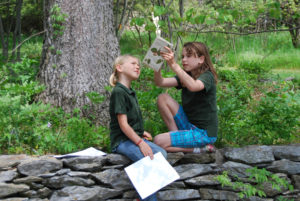 Exploring and utilizing the world outside the classroom is an integral component of the Elementary experience. Because students are encouraged to pursue their interests and further their learning, Mountainside offers a vibrant Going Out program, which allows students access to community resources and further enables them to develop and refine social skills and self-reliance. As students pursue greater depth in their work, they find the need to enter the “real world” to gather additional information. Perhaps they visit a museum, interview a specialist, or investigate an animal species at the local Zoo. Trips are planned by a small group of students. They plan the trip, arrange transportation and make the necessary arrangements. These Practical Life experiences place the responsibility on the students and allow them to develop vital communication and organizational skills.
Exploring and utilizing the world outside the classroom is an integral component of the Elementary experience. Because students are encouraged to pursue their interests and further their learning, Mountainside offers a vibrant Going Out program, which allows students access to community resources and further enables them to develop and refine social skills and self-reliance. As students pursue greater depth in their work, they find the need to enter the “real world” to gather additional information. Perhaps they visit a museum, interview a specialist, or investigate an animal species at the local Zoo. Trips are planned by a small group of students. They plan the trip, arrange transportation and make the necessary arrangements. These Practical Life experiences place the responsibility on the students and allow them to develop vital communication and organizational skills.
The Arts
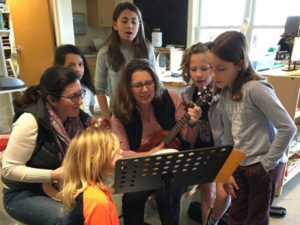 Creative expression is essential in a Montessori education. At Mountainside, Upper Elementary students have exposure to the drama program and are able to perform with the Adolescent students each year in the spring performance, as well as, the winter performance. Various musical instruments are available in the classroom for student use on a daily basis. Additionally, a range of media are available for creating visual art pieces.
Creative expression is essential in a Montessori education. At Mountainside, Upper Elementary students have exposure to the drama program and are able to perform with the Adolescent students each year in the spring performance, as well as, the winter performance. Various musical instruments are available in the classroom for student use on a daily basis. Additionally, a range of media are available for creating visual art pieces.
